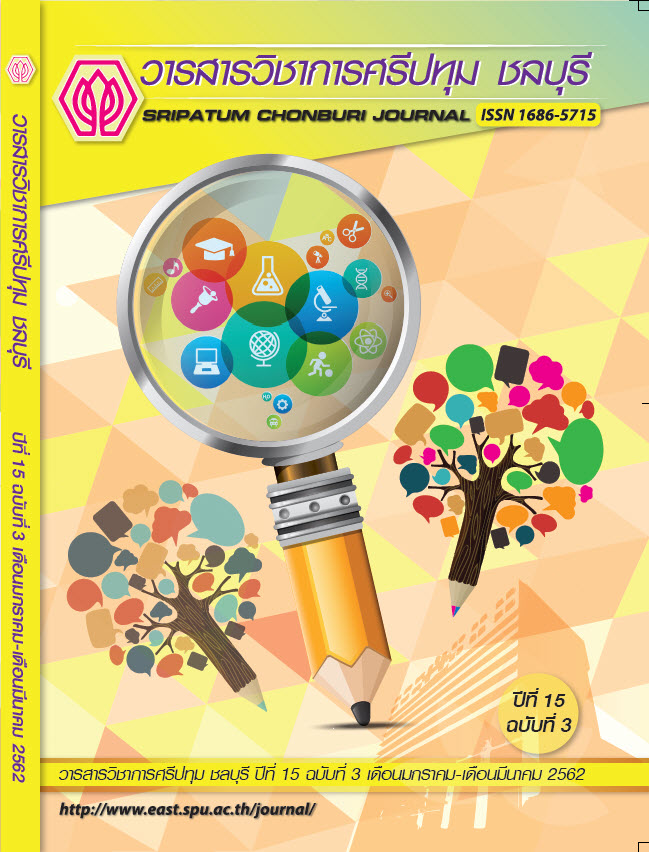MACHINE LEARNING FOR INTELLIGENT ITEM BANK TO ENHANCE THE PROFESSIONAL COMPETENCIES OF SOFTWARE DEVELOPER
Keywords:
item bank, machine learning, software development professional competencyAbstract
The objectives of the paper are to synthesize the components of the item – banking system, and present the framework of the intelligent item - banking by using machine learning techniques to enhance the professional competencies of software developer. Machine learning techniques is applied to simulate human learning and promote the item - banking system, which is a set of tests created with the same standard, using statistical data form the test as a significant tool to evaluate the professional competencies. The synthesis of the components of the item - banking system was based on the synthetic tables of previous research from 2012 to 2017, the 13 research results from synthesis the item - banking system consisted of 5 main components as follows: user management, question management, examination management, evaluation management, and scoring management.
The framework of the intelligent item - banking system based on machine learning approaches can be divided into 2 parts which are the relevant users including teachers, students, administrators and the framework of the intelligent item - banking system which is consisting of user management but without machine learning, question management with supervised machine learning to automatically group test items, examination management with supervised machine learning to choose suitable test items for a competency result, examination management with supervised machine learning to predict the test results and give the suggestion, and scoring management without machine learning.
References
ปิยะ ถิรพันธุ์เมธี และพัลลภ พิริยะสุรวงศ์. (2557). การพัฒนารูปแบบเฟรมเวิร์คธนาคารข้อสอบบนระบบ ประมวลผลแบบกลุ่มเมฆ. วารสารวิชาการและวิจัย มทร.พระนคร สาขาวิทยาศาสตร์และ เทคโนโลยี, 8(2), หน้า 27-41.
สถาบันคุณวุฒิวิชาชีพ (องค์การมหาชน). (2560). ฐานข้อมูลมาตรฐานอาชีพ คุณวุฒิวิชาชีพ สาขา ซอฟต์แวร์และการประยุกต์ (software and applications) (ออนไลน์). เข้าถึงได้จาก:
https://tpqi-test.tpqi.go.th/tpqi_sa/index.php?page=Pathway.php&OCC=SWA [2560, 9 พฤศจิกายน].
Ajinaja, Michael. (2017). The design and implementation of a computer based testing system using
component-based software engineering. International Journal of Computer Science and Technology, 8(1), pp. 58-65.
Armstrong, Harry. (2015). Machines that learn in the wild: Machine learning capabilities, limitations
and implications (Online). Available: https://media.nesta.org.uk/documents/machines_that_learn_in_the_wild.pdf [2017, September 9].
Banerjee, Shilpi, Rao, N. J., & Ramanathan, Chandrashekar. (2016). Designing item banks in alignment
with course outcomes for engineering courses (Online). Available:
https://www.researchgate.net/publication/311586996_Designing_Item_Banks_in_Alignment_
with_Course_Outcomes_for_Engineering_Courses [2017, September 9].
Cong, Yan. (2015). Functional design of English online examination system based on ASP technology.
In 3rd International Conference on Education, Management, Arts, Economics and Social
Science (pp. 1140-1144). Jinzhou, China: Bohai University.
Gupta, P. K. (2012). Mobile examination system. In Proceedings of 2012 2nd IEEE International
Conference on Parallel, Distributed and Grid Computing (PDGC) (pp. 302-306). Uttar Pradesh, India: Jaypee University of Information Technology.
Ji, Jun, et al. (2016). Design and implementation of online examination system. In 2016 International
Conference on Applied Mechanics, Mechanical and Materials Engineering (pp. 2-4). Lancaster, PA: DEStech.
Kalyankar, Gauri D., Poojara, Shivananda R., & Dharwadkar, Nagaraj V. (2017). Predictive analysis of diabetic patient data using machine learning and Hadoop. In 2017 International Conference on I-SMAC (IoT in Social, Mobile, Analytics and Cloud) (I-SMAC 2017) (pp. 619-624) (Online). Available: https://ieeexplore.ieee.org/document/8058253?denied= [2017, September 9].
Ketui, Nongnuch, et al. (2016). Item-based approach for online exam performance and its application. In
2016 13th International Conference on Electrical Engineering/Electronics, Computer, Telecommunications and Information Technology (Online). Available:
https://ieeexplore.ieee.org/document/7561297 [2017, September 9].
Khater, E., Hegazy, A., & Shehab, M. E. (2015). Ontology-based adaptive examination system in e- learning management systems. In 2015 IEEE 7th International Conference on Intelligent
Computing and Information Systems (pp. 243-250) (Online). Available:
https://ieeexplore.ieee.org/abstract/document/7397228 [2017, September 9].
Kosba, Essam, Badawy, Osama, & Sabri, Passant. (2013). Intelligent examination system to support
teacher’s reflection measurement of students’ guided feedback. In International Conference:
The future of Education (Online). Available: https://pdfs.semanticscholar.org/6a6b/
38846133ffbd6dc80e30499316c3282b4c2e.pdf [2017, September 9].
Kuyoro, Shade O., et al. (2016). The design and implementation of a computer based testing system.
Journal of Applied Computation, 1(1), pp. 1-7.
Lu, Peng, Cong, Xiao, & Zhou, Dongdai. (2014). The research on web-based testing environment
using simulated annealing algorithm (Online). Available:
https://www.ncbi.nlm.nih.gov/pmc/articles/PMC4052093/ [2017, September 9].
Portugal, I., Alencar, P., & Cowan, D. (2015). The use of machine learning algorithms in recommender systems: A systematic review (Online). Available:
https://arxiv.org/ftp/arxiv/papers/1511/1511.05263.pdf [2017, November 9].
Rajamani, Kavitha, & Kathiravan, Vijaya. (2013). An adaptive assessment system to compose serial test sheets using item response theory. In Proceedings of the 2013 International Conference on Pattern Recognition, Informatics and Mobile Engineering (PRIME) (pp. 120-124). Tamilnadu,
India: Periyar University.
Sangodiah, Anbuselvan, Ahmad, Rohiza, & Ahmad, Wan Fatimah Wan. (2016). Integration of machine learning approach in item bank test system. In 2016 3rd International Conference on Computer and Information Sciences (pp. 164-168) (Online). Available:
https://ieeexplore.ieee.org/document/7783208 [2017, November 9].
Stucky, B. D., et al. (2014). Developing an item bank and short forms that assess the impact of asthma
on quality of life. Respiratory Medicine, 108(2), pp. 252-263.
Wang, Mei-Hui, et al. (2014). Type-2 fuzzy set construction and application for adaptive student assessment system (Online). Available: https://ieeexplore.ieee.org/document/6891894?denied=
[2017, November 9].
Downloads
Published
Issue
Section
License
บทความทุกบทความเป็นลิขสิทธิ์ของวารสารวิชาการศรีปทุม ชลบุรี



